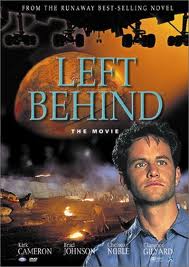
Here is why it's important to pay attention to the context of Bible verses. You know the song "I Wish We'd All Been Ready," aka the "Rapture Song?" Originally written by Larry Norman and later remade by DC Talk, the song contains the lines: "A man and wife asleep in bed / She hears a noise and turns her head / He's gone / I wish we'd all been ready / Two men walking up a hill / one disappears and one's left standing still / I wish we'd all been ready." This song assumes a view of history and theology known as "dispensationalism." (An easy way to find out if you're a dispy: If you hold to a rapture, then a literal 7-year tribulation, you're a dispy!) In this view, being "left behind" is a bad thing. Being taken away is a good thing.
When we look at the biblical text, however, the opposite is true. The lines from the song quoted above come from Luke 17:34-36. Taken together with other passages, such as Luke 22:20-24, it is clear that Jesus is talking about the destruction of Jerusalem, which happened in AD 70. In Luke 17:34-36, Jesus says, "One will be taken...another left..." about pairs of people. So his disciples ask the natural question, "Where are they going to be taken?" (v. 37) Jesus answers, "Where there is a dead body, the vultures will gather." Notice: those who are taken away are taken away to judgment, to death, to slaughter.
This is not a pretty picture, but it is one that is familiar to Jesus' audience. This has happened before in Israel's history. God has sent prophets who say: repent or suffer judgment, destruction, exile! Those who are "taken away" in Israel's history are those who suffer the loss of their land, their homes, their temple, their cities, and often their lives. Often, these are the kings and the wealthy, the lords of the lands. Why? When judgment falls, it falls hardest on those with the most to lose. Those who are left behind are those who get to stay in the land. And who are those? The poor and the downtrodden, typically. "The meek shall inherit the earth" is not just a nice saying; it had already happened at least once in Israel's history in the exile.
And it will happen again. In the vision of Revelation 21-22, the saints do not leave the earth behind to be whisked to some faraway place. Those who are "taken away" are death, Hades, and the unrepentant, whose names aren't written in the book of life (Rev. 20:14-15) The ultimate destination of the people of God, however, is where the biblical story begins: this earth, purged of sin and redeemed. (This is good Wizard of Oz theology--there's no place like home!) We do not go somewhere else to join God; the fullness of God's presence comes to us (Rev. 21:2-4). So do I want to be left behind? You bet.
For more on biblical interpretation, check out my new online course "Foundations of Biblical Interpretation."
When we look at the biblical text, however, the opposite is true. The lines from the song quoted above come from Luke 17:34-36. Taken together with other passages, such as Luke 22:20-24, it is clear that Jesus is talking about the destruction of Jerusalem, which happened in AD 70. In Luke 17:34-36, Jesus says, "One will be taken...another left..." about pairs of people. So his disciples ask the natural question, "Where are they going to be taken?" (v. 37) Jesus answers, "Where there is a dead body, the vultures will gather." Notice: those who are taken away are taken away to judgment, to death, to slaughter.
This is not a pretty picture, but it is one that is familiar to Jesus' audience. This has happened before in Israel's history. God has sent prophets who say: repent or suffer judgment, destruction, exile! Those who are "taken away" in Israel's history are those who suffer the loss of their land, their homes, their temple, their cities, and often their lives. Often, these are the kings and the wealthy, the lords of the lands. Why? When judgment falls, it falls hardest on those with the most to lose. Those who are left behind are those who get to stay in the land. And who are those? The poor and the downtrodden, typically. "The meek shall inherit the earth" is not just a nice saying; it had already happened at least once in Israel's history in the exile.
And it will happen again. In the vision of Revelation 21-22, the saints do not leave the earth behind to be whisked to some faraway place. Those who are "taken away" are death, Hades, and the unrepentant, whose names aren't written in the book of life (Rev. 20:14-15) The ultimate destination of the people of God, however, is where the biblical story begins: this earth, purged of sin and redeemed. (This is good Wizard of Oz theology--there's no place like home!) We do not go somewhere else to join God; the fullness of God's presence comes to us (Rev. 21:2-4). So do I want to be left behind? You bet.
For more on biblical interpretation, check out my new online course "Foundations of Biblical Interpretation."
 RSS Feed
RSS Feed